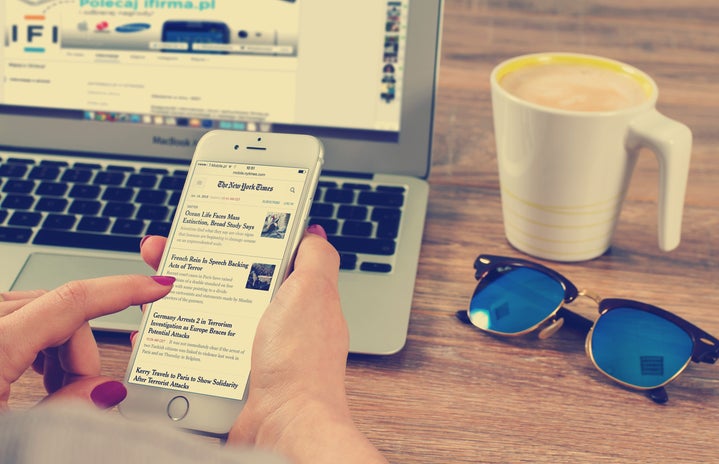The article below was written by Lara Sanchez and edited by Isabela Novelli Maciel. Liked this type of content? Check out Her Campus Cásper Líbero for more!
The COVID-19 pandemic, especially in Brazil, has brought some important questions about health and science. As the news kept being published and the cases were going up – and it seemed not even close to going down – a lot of discussions concerning trusting – or not – science, fake news, personal beliefs, and a whole world of doubts terrified the country. Besides the scientists, doctors, nurses, and all the healthcare workers, other professions have been socially affected — journalists were accused by some of being illegitimate. A series of comments about the news and the media were heard: should we believe the journalists? Are they telling the truth? Are they omitting or overstating things?
Although this type of violence has increased during this pandemic, journalists who cover science in Brazil have always been through difficult situations — science denial movements and lack of investments in this area are some of the reasons why it is so hard for us to see science specialized journalists. They are normal people who face tough situations as any journalist, but in an area “that deals with people’s personal life aspects”, according to Vanessa Sulina, a journalist specialized in health.
Sulina is a graduated journalist since 2007 and started working with city and law sections, but fell in love with health and made her career in this area. About 5 years ago, she migrated to economy and digital market, however, says health was the apex of her journey and that is still passionate about it.
She started on the internet, where the news portal the journalist used to work published the articles. “We have to do a lot of research, seek for sources, talk to specialists — then we can write hard or soft news, as other areas. As it was on the internet, we had the freedom to post a lot — there is more space than on TV, for example”, Sulina explains. Until now, just an everyday routine for any newsroom journalist.
Then, she continues: “I got the phase of the Zika Virus, we started it from zero. What was happening? There was no information, it was just like COVID last year. We talked to scientists, physicians, and it began to gain a bit of density. As we researched and talked to them, we went deeper and deeper in the topic”.
The internet is propitious to the spread of fake news. Sulina pointed out that you have to be attentive to check everything even more than you would in any other area, since “health and science journalism holds a social responsibility because they attend to people’s most valuable heritage — their health”. Therefore, everything that is posted requires redoubled attention, especially because people will seek treatment and think about their health issues starting from that.
She also claims that, even though it has always been like that, journalists are even more overwhelmed nowadays. It might be due to the high demand for news — politics, economy, and other areas crashing, a lot of events worldwide, and more. This also implies the fact that some journalists do not even have the opportunity to study and delve into the areas they would like to, and that is possibly why we do not see so many science-specialized professionals very often. It causes a phenomenon of more generalist news, that, according to Vanessa Sulina, “is different than seeing something made by someone who studied that for years, has the practice of doing this”.
For her, practicing is the best school for science journalism, and, being such a sensitive matter, it should be encouraged. For that, she believes meetings and talks about the topic need to be promoted — she participated in some events that were organized or sponsored by the pharmaceutical industry. Symposiums gathering specialists, authorities, and media are also something that she thinks should be increased.
The science journalist pointed out that it is very difficult in Brazil to have access to data, “which seems controversial since we have the law of access to information”. Proof of that is that during the COVID pandemics the press vehicles had to unite with each other to have trustworthy numbers about the death cases and other issues because the journalists were having problems accessing data from the government.
From her own experience, Sulina says that this is “not only for COVID, I had a lot of problems when I worked with this. Especially if you compare to other countries, Brazil is very deficient in this question of gathering data. It also has an impact on the journalist’s work. There should be symposiums even to guide and teach what to do in this aspect, how to work with databases. And even to help on how to get information properly, sometimes there might be something relevant and we are there, not knowing what’s happening. I basically only learned by practicing”.
All these problems undoubtedly affect journalists too. There are fewer and fewer professionals to work — they are assigned to do what their boss thinks to be a top priority and sometimes have to do a lot of things together. “They feel down and frustrated, and, for being overwhelmed, can not go on a new course or event. Your quality decreases as well”, she says, and continues: “There is still a lot of health-related stuff in Brazil that doesn’t work. Health in Brazil is totally focused on the disease, and not prevention, for example. There are some nice things, indeed, but there are problems we are not looking at because sometimes we are so tired and overwhelmed we can’t deepen these issues”.
Despite the difficulties, she thinks it’s great to add information that will be useful to friends, family, and society in general. “It’s challenging because we’re being affected as well, we have empathy. In the COVID-19 pandemic, for example, they are covering something that they are in the middle of. It was all starting and they had to go and dig for questions and answers. We have to be really careful not to fall into the ‘herd effect’ and miss the proper information, it is challenging and that is what is really cool”.


